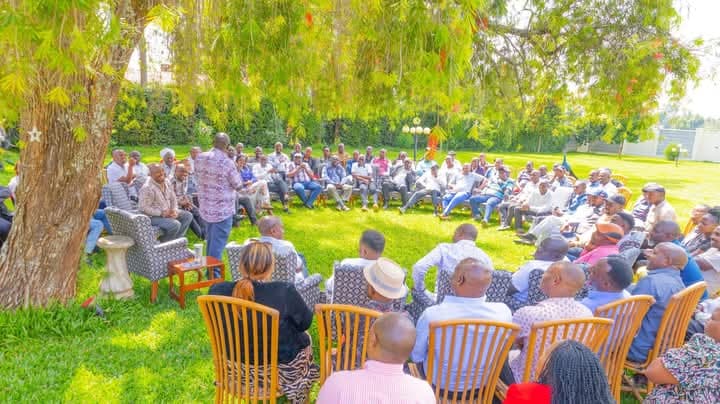The dangers of heckling and throwing objects to the dais at a meeting attended by the President have always been clear ever since tens of people were shot dead by President Jomo Kenyatta’s body guards at a Kisumu function in 1969.
It was doubly symbolic that the crowd could misbehave in similar fashion forty five years later at a function held in Luo Nyanza attended by Mzee’s son – President Uhuru Kenyatta. Only this time the President’s body guards were more forgiving.
The same has happened again, this time Fifty Five Years Later, as President William Ruto addressed a Crowd in Migori.
While it is simple to conclude that wananchi are yet to heed the lesson of 1969, it should also be noted that little has changed in presidential security fifty four years on. Today's events in Migori should not have happened had changes been made to the President’s security at public gatherings.
President William Ruto has narrowly dodged a shoe hurled at him—while addressing a crowd in Kehancha Town, Migori County.
The incident occurred shortly after the Head of State had launched a 298-unit affordable housing project, part of his administration’s ambitious plan to provide low-cost homes to Kenyans across the country. As President Ruto engaged with the crowd and emphasized his government’s commitment to development, an unidentified person hurled the Shoe toward him.
In the dramatic turn of events on Sunday, the shoe flew through the air caught Ruto unawares and blushed the President momentarily startling him.
This bold act underscores the rising tensions in parts of the country, especially in regions where political sentiments have been strongly divided. Despite the interruption, President Ruto concluded his speech, reiterating his vision for national unity and economic progress.
Security personnel swiftly intervened, scanning the crowd and attempting to identify the source of the disruption. While the assailant’s identity remained unclear at the time of reporting, authorities are expected to investigate the incident thoroughly.
In a country where politicians gauge their popularity by the crowds they can pull at political meetings, open air informal gatherings present low hanging fruit which must be picked to score political points.
The problem with such gatherings is that it is difficult to vet and control the crowds. This opens up avenues through which political opponents can plant their stooges to heckle and embarrass those at the dais at the opportune moment.
It is almost impossible to lock down open air gatherings to arrest offenders. Thus, a minor incident is bound to set off a domino effect. A shoe is thrown on to the dais, guards swarm in to isolate the offender but succeed in only sending every other person into panic forcing the meeting to unravel to chaos. No record of attendees exists so security officers have to seize the moment and arrest suspects or risk a barracking from their seniors. In desperate times, security officers may have to shoot to be seen to be acting often injuring or killing the innocent.
There’s also the folly of too many cooks spoiling the broth. Often, the dignitaries and officials at the dais each arrive with their own body guards. Add to that the regular police and the ubiquitous political party youth wing members ganging up as de facto bouncers. This cacophony of too much security is bound to unwind to insecurity due to the lack of a clear chain of command. On some rare occasions, the security officers may turn out to be the source of mayhem.
It is foolish to do things the same way and expect different results. We may have to contemplate seismic changes in not only the President’s security but also how other leaders go about in meeting the people.
Leaders need to embrace formal gatherings at social halls and eschew the risky open air meetings that attract foul mouthed louts like moths to a source of light. The former will attract more knowledgeable audiences who apart from engaging the leaders in terms of informed opinion and raising pertinent issues and questions are also more likely to behave themselves. Formal gatherings will also lighten the load on security officers who will find it easier to vet and control attendees.







